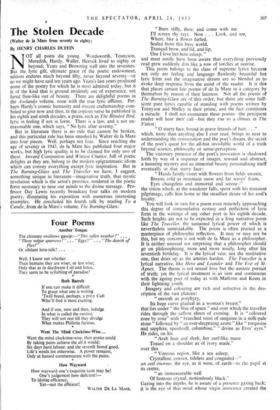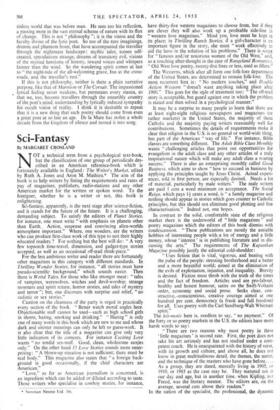The Stolen Decade
NOT all poets die young. Wordsworth, Tennyson. Meredith, Hardy, Waller, Herrick lived to eighty or beyond; Yeats and Browning well into the seventies. But the lyric gift, ultimate grace of the poetic endowment, seldom endures much beyond fifty, never beyond seventy—or so we might have said ten years ago. Yeats"s last years produced some of the poetry for which he is most admired today, but it is of the kind that is ground stridently out of experience, not lured flute-like out of beauty. There are delightful poems in the Asolando volume, none with the true lyric 'afflatus. Per- haps Hardy's cosmic humanity and sincere craftsmanship com- bined to give now and then, in the copious verse he published in his eighth and ninth decades, a poem, such as The Blinded Bird, lyric in feeling if not in form. There is a law, and a not un- reasonable one, which says, " No lyric after seventy."
But in literature there is no rule that cannot be broken, and this particular rule has been smashed by Walter de la Mare into four pieces. Well, perhaps not four. Since reaching the age of seventy in 1943, de la Mare has published four major works, but high lyric quality is to be claimed for only two of these. Inward Companion and Winged Chariot, full of poetic delights as they are, belong to the modern epigrammatic idiom which can convey everything except lyric inspiration. But in The Burning-Glass and The Traveller we have, I suggest, something unique in literature—imaginative truth, that mystic revelation which is the artist's province, rendered in the poetic form necessary to tune our minds to the divine message. Pro- fessor Day Lewis recently broadcast four talks on modern poetry, illustrating his exposition with numerous interesting examples. He concluded his fourth talk by reading To a Candle, from de Ia Mare's volume, The Burning-Glass: " Burn stilly, thou; and come with me.
I'll screen thy rays. Now . . . Look, and see, Where, like a flower furled, Sealed from this busy world. Tranquil brow, and lid, and lip, One I love lies here asleep; and must surely have been aware that everything previously read grew suddenly dim like a row of torches at sunrise.
This poem belongs to the class of supreme lyrics because not only are feeling and language flawlessly beautiful but lyric form and the imaginative dream are so blended as to evoke deep response from the mind of the reader. It is this that places certain late poems of de la Mare in a category by themselves by reason of their lateness. Not all the poems of The Burning-Glass are of this order, but there are some half- score pure lyrics capable of standing with poems written by Tennyson and Shelley in their prime, and the fact constitutes a miracle. I shall not enumerate these poems—the percipient reader will hear their call—but they rise to a climax in The Vision: "0 starry face, bound in grave strands of hair. . .." which, more than anything else 1 ever read, brings us near to understanding the consecration and the poet's dream, the secret of the poet's quest for the all-but inviolable world of a truth beyond science, philosophy or sense-perception.
The visionary presence of the poet's invocation is shadowed forth by way of a sequence of images, sensual and abstract, a haunting mystery and an immortal beauty personalising itself eventually in that starry face: " Hands faintly sweet with flowers from fields unseen, Breasts cold as mountain snow and far waves' foam, Eyes changeless and immortal and serene:" the vision which, as the wanderer falls, spent with his transient pilgrimage, calls him home to the steadfast desire of his soul's loyalty.
You will look in vain for a poem even remotely approaching this degree of contemplative ecstasy and perfection of lyric form in the writings of any other poet in his eighth decade. Such heights are not to be expected in a long narrative poem like The Traveller, the sustained lyrical power of which is nevertheless unmistakable. The poem is often praised as a masterpiece of philosophic reflection. It may or may not be this, but my concern is not with de Ia Mare as a philosopher. It is neither unusual nor surprising that a philosopher should go on philosophising, more and more wisely, long after his seventieth birthday. It is the lyrical vein, not the meditative one, that dries up as the arteries harden. The Traveller is a lyrical narrative, like Hero and Leander and The Eve of St. Agnes. The theme is not sexual love but the austere pursuit of truth; yet the lyrical treatment is as sure and continuous with the ageing poet of today as with Marlowe and Keats in their lightning youth. Imagery and colouring are rich and seductive in the des- cription of the vast plateau: " smooth as porphyry, Its huge curve gradual as a woman's breast," that lies under " the blue of space " and over which the traveller rides through the saffron sheen of evening. It is " coloured zone by zone" with " branched veins of sanguine in a milk-pale stone " followed by " an ever-deepening azure ", like " torquoiso and sapphire, speedwell, columbine," " divine as Eros' eyes." He rides, on his " Arab lean and sleek, her surf-like mane Tossed on a shoulder as of ivory made," over this " Vitreous region, like a sea asleep, Crystalline, convex, tideless and congealed—" un oeil inorme, the eye, as it were, of earth—to the pupil at its centre, " an immeasurable well Of lustrous crystal, motionlessly black."
Gazing into the depths, he is aware of a presence gazing back; it is the eye of that mind whose virgin innocence created the sinless world that was before man. He sees too his reflection, a passing mote in the vast eternal scheme of nature with its flux of change. This is not " philosophy "; it is the vision and the faculty divine of the lyric poet. So too of the rare imaginings, dreams and phantom hosts, that have accompanied the traveller through the nightmare landscape: mythic tales, scenes self- created, speculations strange, dreams of transitory evil, visions of the myriad heroisms of history, inward voices and whispers fainter than the wind. So the wandering spirit comes at last to " the night-tide of the all-welcoming grave, Inn at the cross- roads, and the traveller's rest."
If this is not philosophy, neither is there a plain narrative purpose, like that of Marmion or The Corsair. The impassioned lyrical feeling never weakens, but permeates every stanza, so that we, too, become travellers through the unearthly country of the poet's mind, understanding by lyrically induced sympathy his occult vision of reality. I think it is desirable to repeat that it is a new thing that such poetry should come from even a great poet at so late an age. De la Mare has stolen a whole decade from the kingdom of silence and turned it into song.



































 Previous page
Previous page